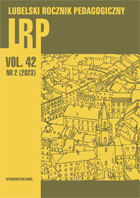LEARNING ENVIRONMENT IN THE OPTICS OF CRITICAL CONSTRUCTIVISM
LEARNING ENVIRONMENT IN THE OPTICS OF CRITICAL CONSTRUCTIVISM
Author(s): Anna Perkowska-Klejman, Anna Górka-StrzałkowskaSubject(s): School education, Sociology of Education, Pedagogy
Published by: Wydawnictwo Naukowe Uniwersytetu Marii Curie-Sklodowskiej
Keywords: critical constructivism; learning environment; pupil/student;
Summary/Abstract: Introduction: This article is an attempt to show the constructivist learning environment as a mo- del, as a concept that assumes that the student is an active, not a passive participant in the process of gaining in-depth, flexible and systemic knowledge rather than fragmentary, rigid or mechani- cally reproduced. The text focuses on the contemporary needs of students based on radical and social constructivism. The main dimensions of critical constructivism and elements of a con- structivist learning environment are outlined based on Peter Taylor and Barry Fraser’s concept. Research Aim: The aim is to show critical constructivism as a set of various theories, concepts creating conditions for independent construction of knowledge and creating a friendly-lear- ning environment. Evidence-based Facts: The concept is derived from the teaching imperative (John Dewey, Jean Piaget, Lev Vygotsky and Howard Gardner). It assumes that learning is an active process of con- structing knowledge based on the experience of the learner and such construction is usually com- pleted subjectively and metacognitively). The concept of constructivism is quite often used by both theoreticians (academic lecturers and researchers) as well as practitioners (school teachers). Summary: In the article, we analyze the role played by a constructivist learning environment that radically questions the vision of a student as a passive recipient and gives him the status of an active subject contributing to the construction of a learning-friendly environment. Educa- tion should be seen as supporting the student in the process of creating meanings that allow to construct your own understanding of the world.
Journal: Lubelski Rocznik Pedagogiczny
- Issue Year: 42/2023
- Issue No: 2
- Page Range: 7-21
- Page Count: 15
- Language: English

